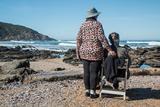Role of Specialty Pharmacy

Sonali Acharya, PharmD. will explain the role of specialty pharmacies. We will discuss accreditation requirements for specialty pharmacies, process to determine which medications are considered specialty and specifically the benefits of a healthcare system specialty pharmacy.
Category
- Patient Centered Care
Format
- Self-Paced, Online Courses
Credits
- 1.00 ACPE Pharmacist
- 1.00 ACPE Pharmacy Tech
- 1.00 AMA PRA Category 1 Credit™
- 1.00 ASRT
- 1.00 CTR
- 1.00 NCPD/CNE
- 1.00 Participation
Improving the Lives of Adolescents and Young Adults with Cancer

Lauren Lux, MSW and Melissa Matson, MSN, RN, AGPCNP-BC and Catharine Swift, MSW, LCSW highlight tools and strategies that healthcare providers can deploy to meet the medical and psychosocial needs of the AYAs in their care.
Category
- Patient Centered Care
Format
- Self-Paced, Online Courses
Credits
- 1.00 ACPE Pharmacist
- 1.00 ACPE Pharmacy Tech
- 1.00 ASRT
- 1.00 NCPD/CNE
- 1.00 Participation
Improving Recognition and Treatment of Cognitive Problems in Cancer

Dr. Nakamura will present on key topics related to cognitive issues experienced by patients with cancer.
Category
- Patient Centered Care
Format
- Self-Paced, Online Courses
Credits
- 1.00 ACPE Pharmacist
- 1.00 ACPE Pharmacy Tech
- 1.00 ASRT
- 1.00 CTR
- 1.00 NCPD/CNE
- 1.00 Participation
Integrating the Caregiver as a Member of the Multidisciplinary Care Team - SPOC

Erin Kent, PhD, MSc, and Loretta Muss, RN, BA, discuss how to recruit the caregiver into the patient’s plan of care and understanding the role and the stresses of being an oncology caregiver.
Category
- Patient Centered Care
Format
- Self-Paced, Online Courses
Credits
- 1.00 ACPE Pharmacist
- 1.00 ACPE Pharmacy Tech
- 1.00 CTR
- 1.00 Participation
An Introduction to Cancer Registry Operations - SPOC

Isiah Zipple, CTR provides a detailed explanation of key cancer registry functions and highlight the data it contains.
Category
- Patient Centered Care
Format
- Non-Credit Course
Credits
- 1.00 Participation
Psycho-Social Complications of Receiving a Cancer Diagnosis and Treatment During the Pandemic - SPOC

This presentation focuses on the unique psychosocial complications related to being diagnosed with - and treated for - cancer during the COVID pandemic.
Category
- Patient Centered Care
Format
- Non-Credit Course
Credits
- 1.00 Participation
Mobile Health and ePROs/symptom Assessment to Assist with Surgical Recovery - SPOC

In this webinar, Angela Smith, MD, MS, FACS discusses the definition and use of electronic patient-reported outcomes (ePROs) and mobile health technology in optimizing postoperative cancer care.
Category
- Patient Centered Care
Format
- Non-Credit Course
Credits
- 1.00 Participation
Cancer Genetics and Genetic Testing - It's Not All in the Family - SPOC

Genetic sequencing technologies are increasingly applied in the oncology setting for a variety of purposes. Genetic testing of tumor specimens can help clarify a diagnosis and inform targeted therapies. Kate Foreman, MS, CGC helps us navigate this field.
Category
- Patient Centered Care
Format
- Non-Credit Course
Credits
- 1.00 Participation
Cryotherapy for Preventing Chemotherapy-induced Neuropathy: Proven, Promising-appearing, or Hogwash? - SPOC

Chemotherapy-induced neuropathy is a major clinical problem that can lead to persistent issues for cancer survivors and can even limit the use of planned chemotherapy treatment during the course of care.
Category
- Patient Centered Care
Format
- Non-Credit Course
Credits
- 1.00 Participation
Early Detection of Colorectal Cancer: Don’t Get Left Behind “45 is the new 50” SPOC

More than ever before, there are rising cases of colon and rectal cancers among young people. Updated recommendations have lowered the age of screening to age 45 from standard age of 50.
Category
- Patient Centered Care
Format
- Non-Credit Course
Credits
- 1.00 Participation

 Facebook
Facebook Twitter
Twitter LinkedIn
LinkedIn Forward
Forward